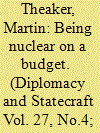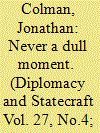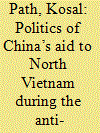|
|
|
Sort Order |
|
|
|
Items / Page
|
|
|
|
|
|
|
| Srl | Item |
| 1 |
ID:
150076


|
|
|
|
|
| Summary/Abstract |
This analysis critiques the impact of President Dwight Eisenhower’s 1953 “Atoms for Peace” initiative on Washington’s alliance with Britain, itself a newly crowned nuclear state. Prime Minister Winston Churchill’s taste for personal diplomacy led him to support his friend’s proposal without real consideration for how the contributions of fissionable materials and manpower demanded by the scheme would damage Britain’s overstretched domestic nuclear project. Membership of an international atomic agency allowed Britain to reaffirm its global status whilst depleting the resources needed to develop its native technology. In turn, the article discusses the commercial challenge posed by American nuclear firms and highlights how reactor exports quickly became a contest between the quality of British research and the quantity of American subsidies. In this way, it establishes how “Atoms for Peace” prejudiced both Britain’s domestic nuclear effort and export potential, in turn shedding light on Washington’s relations with an ailing Great Power.
|
|
|
|
|
|
|
|
|
|
|
|
|
|
|
|
| 2 |
ID:
150079


|
|
|
|
|
| Summary/Abstract |
This analysis considers a controversy over whether the 1925 Geneva Protocol, the treaty prohibiting the use of chemical and biological weapons in warfare, covered CS “tear gas.” Widespread deployment of tear gases by American forces in Vietnam after 1964 attracted much international criticism as many believed the Protocol banned such agents and pressure gradually built on the British government to clarify its interpretative position. Its tabling a disarmament initiative to prohibit production and possession of biological weapons in July 1969 exacerbated the situation, provoking allegations of diverting attention from chemical weapons as a favour to America and the “Special Relationship.” Meanwhile, the outbreak of the “troubles” in Northern Ireland earlier the same year, where British forces also used CS, presented further difficulties. Britain rejected inclusion of CS under the Protocol in February 1970 but wrestled at great length over the decision and its consequences under the Harold Wilson and Edward Heath governments. Largely absent from historical accounts, this episode allows an examination of a complex, convoluted issue that had potentially wide-ranging ramifications for the interpretation of international relations and treaties. Similarly, re-creating confidential inter-departmental decision-making processes, particularly comparing scientific and legal interpretations, the processes of governmental bureaucracy and the role played by civil society demonstrates why an element with little immediate linkage to British overseas affairs proved such a conundrum.
|
|
|
|
|
|
|
|
|
|
|
|
|
|
|
|
| 3 |
ID:
150074


|
|
|
|
|
| Summary/Abstract |
The Amherst embassy has a long-standing reputation as a diplomatic failure in Britain’s early relations with China. This analysis concentrates on a greatly overlooked aspect of the Amherst mission—the controversy within the embassy’s leadership about whether to perform kowtow before the Jiaqing emperor. George Thomas Staunton, basing his arguments on some “local inside knowledge,” successfully prevailed on Amherst to refuse to kowtow. This decision directly resulted in the rejection of the embassy from Beijing. To explain this unpleasant outcome, both sides of the controversy downplayed the importance of their decision and, instead, constructed a capricious image of the Chinese emperor, which helped to lay the foundations for the deterioration of Sino–British relations in the run up to the Opium War.
|
|
|
|
|
|
|
|
|
|
|
|
|
|
|
|
| 4 |
ID:
150080


|
|
|
|
|
| Summary/Abstract |
This analysis examines the disharmony in American–Canadian relations in the period from 2001 to 2005. Canada and the United States co-operated in the early days after the 11 September 2001 terrorist attacks on New York and Washington, managing their mutual border and fighting the war in Afghanistan. Yet they soon came into conflict over American plans to invade Iraq and create a ballistic missile defence [BMD] system for North America. President George W. Bush and Paul Cellucci, his ambassador in Ottawa, were insensitive to Canadian concerns. Canadian leaders sent mixed messages to Washington, hinting that they would support a war in Iraq and participate in the BMD system, but ultimately deciding against each. The article examines the limitations of the tolerant ally interpretation of the Canadian–American relationship and illuminates the role of leadership in the rupture that took place between the two countries.
|
|
|
|
|
|
|
|
|
|
|
|
|
|
|
|
| 5 |
ID:
150077


|
|
|
|
|
| Summary/Abstract |
This analysis explores the largely unsung Moscow ambassadorship of Britain’s Frank Roberts (1960–1962). After examining his Embassy’s role in developing cultural and commercial relations, the article addresses Roberts’ involvement in the Berlin and Cuban missile crises. In the former case, he made a low-key but important contribution by influencing American policy; in the second, he provided insightful assessments of Soviet attitudes and thinking. Roberts’ ambassadorship demonstrated the continued importance of resident embassies and ambassadors, because of the lack of ministerial-level Anglo–Soviet relations and the need to interpret Soviet policy in crisis situations. The research contributes to the literature of diplomatic representation as well as of Anglo–Soviet relations during the Cold War.
|
|
|
|
|
|
|
|
|
|
|
|
|
|
|
|
| 6 |
ID:
150078


|
|
|
|
|
| Summary/Abstract |
Behind the public display of Sino–North Vietnamese unity in the anti-American resistance during the height of the People’s Republic of China’s Cultural Revolution from 1965 to 1969, Beijing’s insistence on Hanoi’s acceptance of Maoist ideology coupled with its assertive demand for Hanoi to denounce Soviet revisionism politicised its economic and technical assistance to North Vietnam. Although appreciating Beijing’s enthusiasm to aid North Vietnam, the Democratic Republic of Vietnam [DRV] resented Beijing’s political and ideological objective of promoting Maoism and anti-Soviet revisionism in North Vietnam. In response, the DRV government asserted independent decision-making and bureaucratic control over the management of foreign economic and technical aid, which in turn collided with the Chinese assertion of superiority and insistence on their control over all China-aided projects. The fragmentation of Chinese bureaucratic institutions and the political chauvinism of some radical Maoists at the Chinese Embassy in Hanoi, who oversaw Chinese aid to North Vietnam, further hindered Beijing’s ability to exert significant influence over Hanoi.
|
|
|
|
|
|
|
|
|
|
|
|
|
|
|
|
| 7 |
ID:
150081


|
|
|
|
|
| Summary/Abstract |
This analysis interrogates how ideology, pragmatism, personal loyalties, and management style all contributed to policy and strategic decisions made by President Ronald Reagan and his Administration (1981–1989). This approach helps to clarify Reagan’s achievements and shortcomings in what is still a somewhat conflicting historiography of his time as president. When woven together, generally, although not always, the three produced effective strategies for achieving clear objectives.
|
|
|
|
|
|
|
|
|
|
|
|
|
|
|
|
| 8 |
ID:
150075


|
|
|
|
|
| Summary/Abstract |
This analysis shows the importance of a problem of maritime law in an on-going debate between two interpretations of Wilsonian neutrality that have competed in various guises since the end of the First World War: can British blockade actions in that war be justified by American Civil War precedents? It proves that reliance on the “Civil War precedents” to justify Britain’s blockade measures was disingenuous from the beginning. British diplomats first used it in October 1914, and Woodrow Wilson embraced it to defend his mild response to British violations of neutral rights to incensed American citizens despite continuous protests from the State Department. Whilst all politicians involved knew the comparison was wrong, historians have embraced it as a justification of Britain’s illegal blockade ever since Arthur S. Link claimed it as the key to understanding Wilson’s neutrality policy.
|
|
|
|
|
|
|
|
|
|
|
|
|
|
|
|
|
|
|
|
|